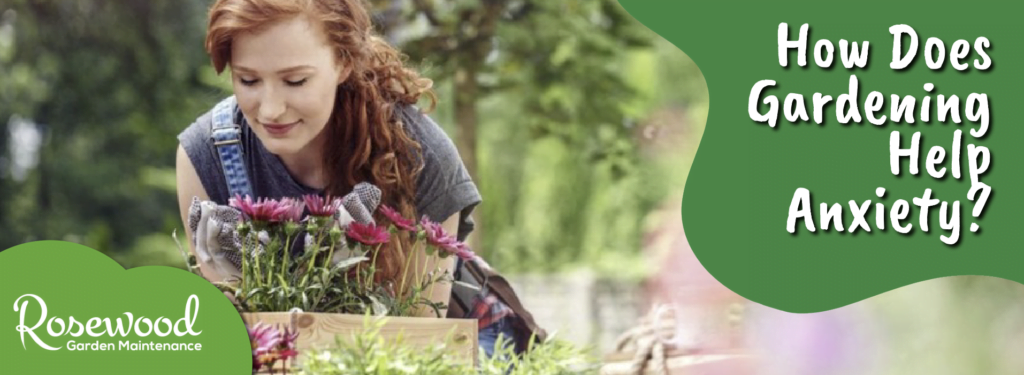
You must be thinking, gardening… How can that help me with my anxiety? If you don’t already have an interest in nurturing plants, you might mostly know it as your parents’ or grandmother’s favourite way to spend a weekend. But gardening and its rewards are most definitely for everyone.
Gardening can provide numerous mental health benefits for people of all ages. In this blog we look at how gardening can benefit you!
Studies have found that gardening and horticultural therapy can help:
- Reduce symptoms of anxiety and depression
- Improve attention
- Lower cortisol, the stress hormone
- Lower BMI
- Increase overall life satisfaction and quality of life
Soil has even been described as having antidepressant properties. There has been research conducted which found bacteria in the soil that actually helps activate brain cells that could produce serotonin. That is a pretty incredible addition to the sense of mindfulness that gardening can bring.
Gardening, like other art therapies, differs from traditional therapies like cognitive behavioural therapy (CBT), because it’s more indirectly beneficial. Rather than working through all of your problems with words, you cope with your hands.
Your plant could be hanging from a hook on your ceiling, and yet there’s something about gardening that is so grounding. Gardening can focus your thoughts, keep your hands busy, and give you something to take care of in the future.
You are able to sow literal seeds as well as figurative ones for your self-esteem by developing a sense of purpose and achievement. You give yourself the opportunity to have clearer thoughts and you can watch your plants grow which gives a sense of accomplishment and feels like you’re watching yourself grow.
Gardening doesn’t only have physical and mental therapeutic potential, but also utility. It gives you something in return: a beautiful garden, fresh herbs, or even some homegrown veggies.
How you can get started
Step 1: Start Easy
If you’re using gardening to soothe your anxiety, you don’t want to create more stress for yourself. So, starting with something that is easy to look after and tend to is a great start.
Starting with small plants like succulents; aloe vera, cacti or jade are a great place to start. Succulents are hardy. They’re often hard to kill, although not impossible and are easy to maintain in an urban space.
Good Plants for first-time gardeners:
- Lucky bamboo
- Air plants
- Snake plants
- Rubber plants
- Succulents
Herbs considered easier to grow:
- Chives
- Mint
- Parsley
- Thyme
Step 2: Evaluate your space
Now that you have some ideas for plant types, think about the kind of space or natural light you have to offer them. Ask yourself these questions: do you have a garden plot to work with? A balcony? Hanging space? Table space? A desk?
The lighting for plants is important. No matter how much we’d hope for the perfect amount of sun, many places are plagued by too little or too much sun. But even with a lack of natural light, you can find the right plant for you.
Succulents can typically handle a lot of sun. Some types can even be grown indoors, especially during the winter months, as they prefer hotter climates.
Lucky Bamboo can handle low light, although it may not grow as much without bright light.
Make sure you make space for yourself near your plants to revel in your work and its beauty.
Step 3: Don’t push yourself to pain
Don’t push yourself to garden in ways that will put you in pain. Remember, it is supposed to be good for you, not painful. If you start aching or are feeling tired, take a break or take the gardening inside and take it easy for a while. Don’t overexert yourself.
After all, this is meant to make your life easier and help you handle your stress and anxiety, so try and make your life easier where you can. You can achieve this by buying a self-watering pot or an accessory that can make it as easy as possible. If you have back issues, don’t force yourself to bend over or work low to the ground. Adapt and use tall, raised beds or focus on container gardening.
Step 4: Choose what makes you happy
Does gardening remind you of a loved one? Does the scent of a specific flower bring back joyful memories? Gardening can be a great opportunity to symbolise something special to you.
Consider picking scents, colours, or food that make you happy. Think chamomile for a soothing scent and blues and greens for calming colours. Then choose the herbs or foods that would be beneficial for your kitchen, like basil or cucumbers.
Whatever you choose, make sure it’ll give your garden meaning and happiness.
The Takeaway
Whether it’s watering a little desk plant, creating an urban or outdoor garden of your own, or simply taking more walks through nature, you can benefit from the plants around you.
Amid a day of anxiety, gardening should make you smile, give you something to show for your efforts and clear your mind. Scientifically, gardening also comes with a number of health benefits that work to improve my anxiety.
Gardening is one of the most enjoyable tools that prove you have the power to control your mental health and anxiety. Having little successes, even if they’re shaped like a succulent, can truly calm your mind.






